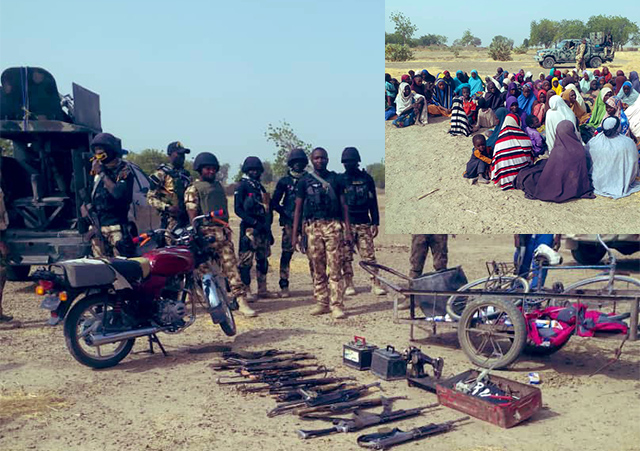 Nigerian army display their weapons seizure and rescue operation in Gamboru Axis, Borno State in March 2021. Inset: 60 rescued captives. [photo: Nigerian Army on Twitter]
Nigerian army display their weapons seizure and rescue operation in Gamboru Axis, Borno State in March 2021. Inset: 60 rescued captives. [photo: Nigerian Army on Twitter]
[This article appears in The Round Table: The Commonwealth Journal of International Affairs. Opinions do not reflect the position of the editorial board.]
On the 26 January 2021, the Nigerian President, Muhammadu Buhari appointed Major General Lucky Leo Irabor as Chief of Defence Staff (CDS), Major General Ibrahim Attahiru as Chief of Army Staff (COAS), Ishiaka Amao as Chief of Air Staff (CAS), and Rear Admiral Awwal Zubairu Gambo as Chief of Naval Staff (CNS). They had replaced General Gabriel Olonishakin, Lieutenant General Yusuf Tukur Buratai, Air Marshall Abubakar Sadique, and Vice Admiral Ibok Ibas, respectively, who had held office from 13 July 2015.
Nigeria has been faced with many security challenges, chief among which is the Boko Haram insurgency which has lasted for over a decade. Apart from that, there has been an increase in banditry and kidnapping in the last four years. Under the watch of the former service chiefs, the insurgents carried out daring attacks on state assets, including on military bases and soft targets. The most recent example of an attack on soft targets was the gruesome beheading of 70 rice farmers in the Zambameri area of Jere in Bornu state. These farmers were accused of supplying intelligence to the military on the movement of the insurgents. The insurgents regularly waylay travellers on the ever-busy Maiduguri-Damaturu road, where motorists are either kidnapped for ransom or killed for alleged affiliation to the government or to non-governmental organisations – sometimes, after being suspected of certain religious inclinations. In the last quarter of 2020, there was also an attack on the governor of the state, Babagana Zulum. He had to be evacuated from his vehicle into a Police Armoured Personnel Carrier (APC). These incidents led to calls from across the political divide that the incumbent service chiefs be relieved of their duty and for fresh ideas to be injected into Nigeria’s security architecture.
Despite these shortcomings, the service chiefs were credited with limiting the capabilities of the insurgents to the three North-Eastern states of Bornu, Yobe, and Adamawa. Before their appointment, the insurgents had carried out daring attacks on the nation’s capital, Abuja, and some north-western States like Kano and Kaduna.
Enter the new service chiefs. The new service chiefs were sworn in on 5 March 2021. Three of the four are not new to the diverse challenges facing the country, especially the insurgency in the north-east. The new CDS, General Lucky Irabor, has served as Theatre Commander, Operation Lafiya Dole (Peace by Force), and as Commander, Multi National Joint Task Force (MNJTF). Irabor as the theatre commander was tasked with the responsibility of flushing Boko Haram and its affiliates out of the north-eastern region. The general was said to have personally led officers and men of the armed forces on various operations against the insurgents. As Commander of MNJTF, he worked closely with other regional armed forces to curtail this menace.
Lieutenant General Attahiru Ibrahim is also no stranger to Nigeria’s fight against the insurgents. In May 2017, he replaced Irabor as the new General Officer Commanding 7th Division, a division that was established to strengthen the war against terror and was given orders by the Army high command to capture or kill the factional leader of Boko Haram; Abubakar Shekau, within forty days. Unfortunately, under his watch, Boko Haram increased the tempo of their attacks. Prominent among these was the killing of at least 50 people at a mosque in November 2017. This eventually led Ibrahim’s sack and redeployment to an unspecified position before eventually being appointed as COAS.
Air Marshal Ishiaka Amao, has also participated actively in the war against insurgents in the north-east. He had served as Commander, 75 Strike Group Yola, Adamawa State. Like Irabor and Attahiru, he was also the Air Component Commander of Operation Zaman Lafiya/Lafiya Dole (Peace/Peace by Force) and doubled as Acting Deputy Theatre Commander (Air Ops) for operation Lafiya Dole.
Some Nigerians think that the new service chiefs cannot be expected to perform magic. They refer to the immediate past Chief of Army Staff, Buratai, He had served as the Commander of MNJTF before being appointed COAS. During his tenure as Commander MNJTF, by all accounts, he was feared by Boko Haram and seen as a warrior. He played a key role in clearing the insurgents from previously held fortresses in the north-eastern part of the country. However, after over five years as COAS, Boko Haram has not been eliminated. There are palpable fears that the same fate might befall the new service chiefs, although some think that the experience of the three service chiefs could go a long way in helping the Nigerian state in its quest to tackle this over a decade-old insurgency. Now that three out of the four new service chiefs were once at the forefront of the war against the insurgents, only time will tell if they will outperform their predecessors or they will be referred to as the same old guards who did nothing to improve Nigeria’s security architecture.
Ismail Bello is a Lecturer at the Department of Political and Administrative Studies, Kampala International University, Kampala, Uganda.



